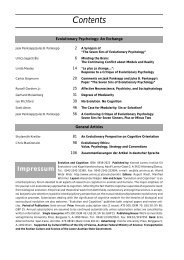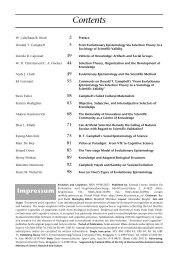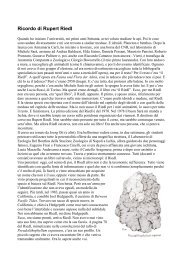Contents - Konrad Lorenz Institute
Contents - Konrad Lorenz Institute
Contents - Konrad Lorenz Institute
You also want an ePaper? Increase the reach of your titles
YUMPU automatically turns print PDFs into web optimized ePapers that Google loves.
Ingo Brigandt<br />
Gestalt Experiments and Inductive Observations<br />
<strong>Konrad</strong> <strong>Lorenz</strong>’s early Epistemological Writings and<br />
the Methods of Classical Ethology<br />
E<br />
thology brought<br />
some crucial insights<br />
and perspectives to the<br />
study of behavior, in particular<br />
the idea that behavior<br />
can be studied<br />
within a comparative–<br />
evolutionary framework<br />
by means of homologizing<br />
components of behavioral<br />
patterns and by<br />
causal analysis of behavior<br />
components and their<br />
integration. Early ethology<br />
is well-known for its<br />
extensive use of qualitative<br />
observations of animals<br />
under their natural<br />
conditions. These observations<br />
are combined<br />
with experiments that try<br />
to analyze behavioral patterns and establish specific<br />
claims about animal behavior. Nowadays, there is<br />
still disagreement about the significance of observation<br />
and experiments and their relation. ALLEN<br />
(forthcoming) points out that in debates about the<br />
interpretation of animal cognition the interpretations<br />
of those ethologists who have actually spent<br />
time watching the animals are favored by some biologists.<br />
In fact, some practitioners of cognitive ethology<br />
feel that experiments at best just confirm what<br />
one already knows, while others are more skeptical<br />
about interpretations of observations without experiments.<br />
As a major representative of ethology <strong>Konrad</strong><br />
LORENZ not only shaped its approach and made the<br />
methods and theories of ethology known to the biological<br />
community and the interested public, he<br />
also embedded his defense of the ethological and<br />
comparative approach in a philosophical theory of<br />
Abstract<br />
During the 1940s <strong>Konrad</strong> LORENZ formulated his early<br />
epistemological views, focusing on the cognitive<br />
mechanisms induction and Gestalt perception. After<br />
the war he used this philosophical framework to defend<br />
the approach of classical ethology against other<br />
approaches to animal behavior. The present paper examines<br />
the relationship between LORENZ’s ethological<br />
methodology and his philosophy of science and knowledge.<br />
The main aim of LORENZ’s post-war epistemological<br />
writings is to provide an epistemological and<br />
cognitive theory of observation in order to defend the<br />
observational approach of classical ethology against<br />
the view that it was no rigorous science.<br />
Key words<br />
<strong>Konrad</strong> LORENZ, Gestalt perception, observation,<br />
ethology.<br />
Evolution and Cognition ❘ 157 ❘ 2003, Vol. 9, No. 2<br />
scientific knowledge. Gestalt<br />
perception and induction<br />
are the main elements<br />
of LORENZ’s<br />
epistemology. These ideas<br />
were originally formulated<br />
during the second<br />
world war (see for instance<br />
the Russian Manuscript,<br />
LORENZ 1948). In<br />
the post-war period<br />
LORENZ emphasized his<br />
epistemological ideas as<br />
part of an attempt to justify<br />
his ethological approach<br />
and his views<br />
about the role of observation<br />
and experiment. The<br />
aim of the present paper<br />
is to call attention to<br />
LORENZ’s philosophical<br />
account and how it integrates with his biological<br />
methodology.<br />
Observation and Experiment<br />
LORENZ’s account of the general character of observation<br />
and experiment remains unchanged<br />
throughout his writings. The specific relationship<br />
between these two aspects is exhibited by LORENZ’s<br />
early biological work as well as his later explicit<br />
methodological account of them (LORENZ 1935;<br />
LORENZ/TINBERGEN 1938; LORENZ 1948, 1981).<br />
LORENZ emphasizes four distinctive features of classical<br />
observational practice: observations are to be<br />
carried out in a hypothesis-free way; the approach<br />
consists in doing qualitative observations rather<br />
than quantitative measurements; animals are to be<br />
observed in their natural environment; and observations<br />
include all features of the organisms and








